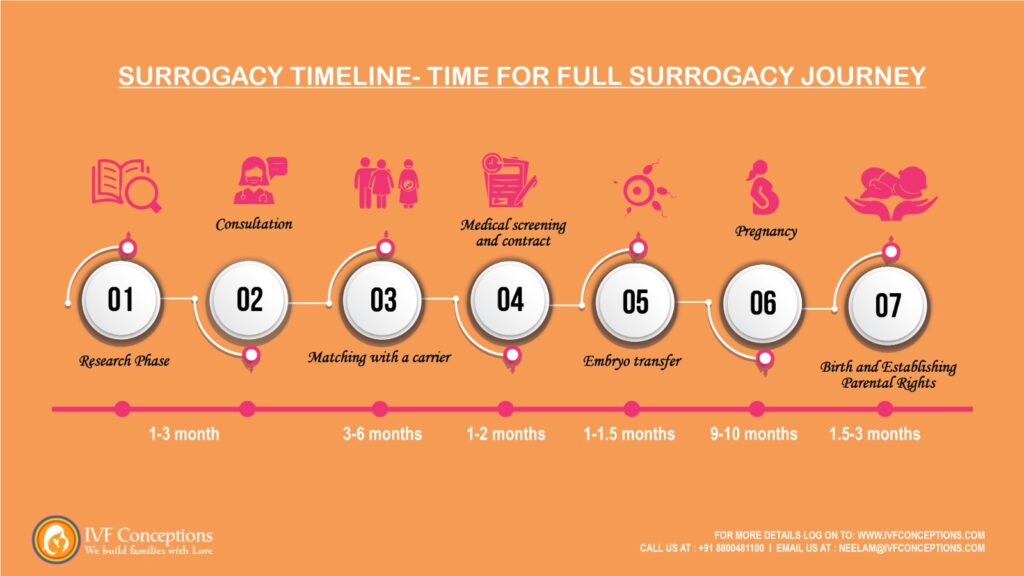Everything About Traditional Surrogacy: A Definitive Guide for Intended Parents

Surrogacy has become an increasingly popular option for individuals and couples struggling with infertility or those who cannot carry a pregnancy themselves. While gestational surrogacy is more common in recent years, Everything About Traditional Surrogacy remains relevant for intended parents exploring different options.
In traditional surrogacy arrangements, the surrogate mother uses her own egg, making her biologically related to the baby. This method is typically facilitated through artificial insemination with donor sperm or sperm from the intended father.
- Book an online appointment: Get a free online consultation.
- Call\W:+91-8800481100 Email:neelam@ivfconceptions.com
Although less common due to legal and emotional complexities, traditional surrogacy can be a viable choice for some families. Understanding traditional vs. gestational surrogacy differences, legal considerations, and emotional aspects of surrogacy is crucial for making an informed decision.
This comprehensive guide will explore everything you need to know about traditional surrogacy, its legal implications, costs, and how it compares to gestational surrogacy.
More Resources to Read:
Surrogacy Guide for Surrogate Mothers
Surrogacy Guide for Intended Parents
How does the surrogacy process work
What is Traditional Surrogacy?
Traditional surrogacy, also known as partial surrogacy or straight surrogacy, is a form of surrogacy where the surrogate mother uses her eggs and carries the pregnancy to term. In this arrangement, the surrogate is genetically related to the child she carries.
Key Points:
- The surrogate’s egg is fertilized using sperm from either the intended father or a sperm donor.
- The surrogate is both the genetic and gestational mother of the child.
- After birth, the surrogate relinquishes her parental rights, and the child is given to the intended parent(s).
Traditional Surrogacy vs. Gestational Surrogacy
Understanding the differences between traditional and gestational surrogacy is crucial for intended parents considering their family-building options.
| Aspect | Traditional Surrogacy | Gestational Surrogacy |
| Genetic Relation | Surrogate is genetically related to the child | Surrogate has no genetic relation to the child |
| Egg Source | Surrogate’s own eggs | Intended mother’s or donor eggs |
| Fertilization Method | Usually Intrauterine Insemination (IUI) | In Vitro Fertilization (IVF) |
| Legal Complexity | More complex due to genetic relation | Generally less complex |
| Availability | Less common, restricted in many jurisdictions | More widely accepted and practiced |
| Cost | Generally lower | Usually higher due to IVF and medical procedures |
Who Might Consider Traditional Surrogacy?

Traditional surrogacy can be an option for certain individuals or couples, including:
- Single men who wish to become fathers
- Gay male couples
- Heterosexual couples where the woman cannot produce viable eggs or carry a pregnancy
- Individuals or couples who prefer a less medically invasive process
- Those who may have limited financial resources for fertility treatments
It’s important to note that many fertility clinics and surrogacy agencies no longer offer traditional surrogacy due to its legal and emotional complexities. Always consult with a reproductive attorney to understand the legal implications in your jurisdiction.
The Traditional Surrogacy Process
1. Initial Consultation and Screening
- Meet with a surrogacy agency or fertility clinic (if they offer traditional surrogacy)
- Undergo medical and psychological evaluations
- Discuss your preferences and requirements
2. Matching with a Surrogate
- Review potential surrogate profiles
- Meet and get to know your potential surrogate
- Ensure compatibility and shared goals
3. Legal Contracts
- Work with a reproductive attorney to draft a surrogacy agreement
- Clearly outline all parties’ rights, responsibilities, and expectations
- Address potential scenarios and contingencies
4. Fertility Treatment
- The surrogate typically undergoes Intrauterine Insemination (IUI)
- Multiple attempts may be necessary to achieve pregnancy
5. Pregnancy and Prenatal Care
- Regular medical check-ups and monitoring
- Ongoing communication between intended parents and surrogate
6. Birth and Legal Procedures
- Establish a birth plan
- Complete necessary legal steps to transfer parental rights
- In some cases, stepparent adoption may be required for the non-biological parent

Legal Considerations in Traditional Surrogacy
The legal landscape for traditional surrogacy is complex and varies significantly by country and even by state within countries. Some key legal considerations include:
- Parental Rights: Establishing legal parentage for the intended parent(s) and terminating the surrogate’s parental rights.
- Contracts: The enforceability of surrogacy contracts varies by jurisdiction. Some places may not recognize them at all.
- Adoption Procedures: In many cases, the non-biological parent may need to complete a stepparent adoption.
- Birth Certificate: Laws regarding whose names can be listed on the birth certificate vary.
- Surrogacy Laws: Some jurisdictions explicitly prohibit or restrict traditional surrogacy.
Always consult with a reproductive law attorney familiar with the laws in your jurisdiction before proceeding with traditional surrogacy.
Emotional and Psychological Aspects
Traditional surrogacy can be emotionally complex for all parties involved due to the genetic connection between the surrogate and the child. Some important considerations include:
- Emotional attachment: The surrogate may experience stronger emotional bonds with the child.
- Genetic connection: Intended parents must be comfortable with the child being genetically related to the surrogate.
- Long-term relationships: Deciding on the level of ongoing contact between the surrogate and the child/family.
- Counseling: Professional psychological support is crucial throughout the process.
Costs Associated with Traditional Surrogacy
While generally less expensive than gestational surrogacy, traditional surrogacy still involves significant costs. The estimated range is typically between $40,000 to $75,000, but costs can vary based on several factors.

Breakdown of potential costs:
- Surrogate compensation
- Medical expenses (including fertility treatments)
- Legal fees
- Agency fees (if applicable)
- Psychological counseling
- Insurance
- Miscellaneous expenses (travel, lost wages, etc.)
It’s important to have a detailed financial plan and discuss all potential costs upfront with your surrogate and any professionals involved in your journey.
Pros and Cons of Traditional Surrogacy
Pros:
- Lower cost compared to gestational surrogacy
- Simpler medical process (IUI vs. IVF)
- Option for single men or gay couples to have a genetic link to the child
- May be the only option for some intended parents
Cons:
- More complex legal situation
- Potential for emotional complications due to genetic link
- Less widely accepted and practiced
- Fewer agencies and professionals offer this service
- May be prohibited or restricted in some jurisdictions
Pros and Cons of Traditional Surrogacy
| Pros | Cons |
| Lower cost compared to gestational surrogacy. | More complex legal situation due to the genetic link. |
| Simpler medical process (Intrauterine Insemination – IUI vs. IVF). | Potential for emotional complications because of the genetic link. |
| Option for single men or gay couples to have a genetic link to the child. | Less widely accepted and practiced compared to gestational surrogacy. |
| May be the only option for some intended parents. | Fewer agencies and professionals offer this service. |
| May be prohibited or restricted in some jurisdictions. |
This table organizes the pros and cons of traditional surrogacy, making it easier for readers to compare and understand the potential advantages and disadvantages.
Alternatives to Traditional Surrogacy
For those who are unsure about traditional surrogacy, there are several alternatives to consider:
- Gestational Surrogacy: Uses IVF with eggs from the intended mother or an egg donor.
- Adoption: Domestic or international adoption of a child.
- Fostering: Providing a temporary home for children in need.
- Embryo Adoption: Adopting and implanting donated embryos.
More Resources to Read:
Infertility Treatment and Surrogacy Process
9 Factors To Improve IVF Pregnancy Rate
International Surrogacy Options Worldwide
Surrogacy Guide for Surrogate Mothers
Conclusion
Traditional surrogacy can be a viable path to parenthood for some intended parents, but it comes with unique challenges and considerations. It’s crucial to thoroughly research the legal, emotional, and financial aspects before deciding if this is the right choice for you. Always work with experienced professionals, including a reproductive attorney and a mental health counselor, to navigate the complexities of traditional surrogacy.
Remember that laws and practices surrounding surrogacy are continually evolving. Stay informed about the current regulations in your jurisdiction and consult with professionals to ensure you’re making the best decision for your family-building journey.
If you’d like to learn more about IVF, Egg Donation, or surrogacy services globally, check out the rest of our website at Complete Surrogacy Agency. We offer legally secure and affordable surrogacy consulting services for FREE.
Complete Surrogacy: Your Trusted Partner in International Surrogacy
At Complete Surrogacy, we have over 15 years of experience in international surrogacy, guiding 4,000+ intended parents worldwide. We provide safe, ethical, and affordable surrogacy solutions for single parents, LGBTQ+ couples, and heterosexual couples.
As members of EFS and ESHRE, we adhere to the highest ethical and professional standards. Our expert team is committed to providing accurate, compassionate, and transparent guidance, ensuring a legally secure and smooth journey to parenthood.
Let us help you build your family with trust, care, and integrity.
Get in touch for one FREE Surrogacy Consultancy!

Frequently Asked Questions About Traditional Surrogacy
What is the main difference between traditional and gestational surrogacy?
Traditional surrogacy uses the surrogate’s own eggs, making her the biological mother, while gestational surrogacy uses eggs from the intended mother or an egg donor.
Is traditional surrogacy legal everywhere?
No, traditional surrogacy is not legal in all jurisdictions. Laws vary significantly by country and even by state within countries. Always consult with a local reproductive attorney.
How much does traditional surrogacy typically cost?
The cost usually ranges from $40,000 to $75,000, but can vary based on individual circumstances and location.
Who typically chooses traditional surrogacy?
Single men, gay couples, and heterosexual couples where the woman cannot produce viable eggs or carry a pregnancy might consider traditional surrogacy.
What are the main risks associated with traditional surrogacy?
Risks include legal complications, emotional challenges due to the genetic link between surrogate and child, and potential disagreements about parental rights.
How long does the traditional surrogacy process usually take?
The timeline can vary, but it typically takes 12-18 months from start to finish, including matching, legal processes, conception, and birth.
Can the surrogate change her mind and keep the baby?
This is a complex legal issue that varies by jurisdiction. It’s one of the reasons why traditional surrogacy is considered riskier and why comprehensive legal agreements are crucial.
How is the surrogate impregnated in traditional surrogacy?
Usually through intrauterine insemination (IUI), a less invasive and less expensive procedure than IVF.
Do most surrogacy agencies offer traditional surrogacy?
No, many agencies and clinics no longer offer traditional surrogacy due to its legal and emotional complexities.
What legal steps are necessary after the birth in traditional surrogacy?
Typically, the surrogate’s parental rights must be terminated, and in some cases, the non-biological intended parent may need to complete a stepparent adoption.
Can the intended parents choose the surrogate in traditional surrogacy?
Yes, intended parents usually have a say in choosing their surrogate, often through an agency or with the help of a fertility clinic.
Is psychological counseling required for traditional surrogacy?
While not always legally required, it’s highly recommended for all parties involved due to the emotional complexities of the process.
How does compensation work in traditional surrogacy?
Compensation varies but typically includes base compensation, medical expenses, and additional fees for specific circumstances. All of this should be clearly outlined in the surrogacy contract.
Can a friend or family member be a traditional surrogate?
Yes, known surrogacy is possible, but it’s important to carefully consider the potential impact on relationships and to have clear legal agreements in place.
What if the intended parents separate during the surrogacy process?
This scenario should be addressed in the surrogacy contract. It’s crucial to have contingency plans for various possible situations.

Author Bio: Neelam Chhagani is an International Surrogacy Expert with 15 years of experience in the fertility and surrogacy domain. As the founder of IVF Conceptions and Complete Surrogacy, she has guided over 4,000 intended parents worldwide on their surrogacy journey to parenthood. Recognized as a trusted authority, she specializes in holistic infertility solutions and third-party reproduction consulting.
Holding an MA in Counselling Psychology and a PGD in Mental Health, Neelam is a proud member of the European Fertility Society (EFS) and the European Society of Human Reproduction and Embryology (ESHRE). She is also a leading surrogacy blogger, providing valuable insights into ethical and practical surrogacy solutions.
Since 2010, committed to supporting ALL family types, Neelam has been passionate about helping intended parents grow their families with compassion, integrity, and a focus on secure and affordable surrogacy options Globally.
Learn more about Neelam:
https://www.ivfconceptions.com/neelam-chhagani-surrogacy-consultant/
https://www.linkedin.com/in/neelam-chhagani-92892229/















I was introduced to Neelam by a friend who worked with Neelam for surrogacy. Neelam is absolutely wonderful. I am a single male and the journey to fatherhood is not that easy. Neelam connected me to a program ideal for my circumstances. She was with me throughout the pregnancy providing advice and guidance along the way. I am so grateful I found her and am thrilled today that I have a beautiful daughter. I highly recommend Neelam to anyone who is on a journey to become a parent. Having a child has changed my world for the better. I wish others success with their own journey and recommend you connect with Neelam to find a path that is best for you.
SA (USA)